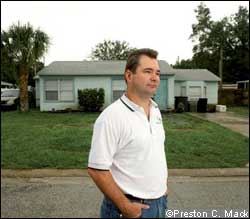
2003年,我和未婚妻在佛罗里达州的圣彼得堡买了一套房子。当时我的生意很兴隆。我们雇了22个人,年销售额在400万到600万美元之间。我们很轻松就能供得起这套三居室的房子。但在2007年,我的业务开始滑坡。我的公司专事消除动物带来的病害:当有人家里有讨厌的野生动物——比如浣熊、负鼠或蝙蝠——出没时,在负责捕捉的公司除掉它们后,我们负责清除它们带来的结核、炭疽等疾病。我们依赖于野生动物捕捉公司的推荐。但在经济衰退时期,人们为了省钱,宁可和阁楼上的浣熊们和平共处。
我不得不裁掉了9个人,并继续艰难经营。但到了2008年,我们已经落到了我甚至连自己的工资都付不起的地步。我有13名员工、一个未婚妻和她的两个女儿,我感到压力很大。我开始和银行商谈我的按揭贷款,最后电话那端有个人建议我拖欠还款。他说,这样一来,我的案子就会被转到另一个部门,到时我就可以重新磋商。对此我并不确定,但我相信银行的话。次月我就停止了还贷,省下了1800美元。我决定把所有的余钱都拿来做广告。房贷被正式认定为违约需要四到五个月,所以我继续不还房贷,把省下的钱全都拿去做广告。我们的业务渐渐地有了起色。
我们在等候银行来信,通知我们房贷已经转到贷款修改部,可以开始和银行重新磋商了。然而,我们等到的却是收回房子的信。我打电话给银行,指出明明是他们建议我停止还贷的。可是,原来我们的贷款已被转手出售,而新公司并不想跟我们磋商按揭条款。
我给我的律师打了电话,当时他刚刚参加完一个有关止赎的会议——命运可真是奇妙。他说:“我想我帮得上忙。”然而,我们非但没有得到重新磋商的机会,还收到了另一家按揭公司发来的一封新的止赎通知。我被搞糊涂了:由于我们的按揭被辗转出售了多次,我们甚至搞不清谁是债主,该给谁打电话商量。
律师建议我别再还款了。他要求那些威胁要收房子的公司出示原始的按揭文件,可他们都没有,所以从法律上来说,他们都不能收我的房子,因为他们无法证明我欠了他们贷款。于是我继续拖欠还款,用省下的钱发展业务,七个月后,我重新实现了盈利。如今两年半过去了,我还是一直都没有还贷。现在我的生意很稳定,我依然住在我的房子里,我甚至考虑开创新的业务。
人们谴责我们,把我们叫做赖债不还的人,指责我们用省下来的钱购置耗油量极大的汽艇,过着花天酒地的生活。但我不接受这些批评。那些大公司对贷款进行战略性违约,把钱投到更需要的地方,去赚取更多的钱。为什么我就不能?
当然,最终我们可能会失去我们的房子,但起码我的公司现在很稳定,需要的话,我也有能力再购买一套房子。假如当初我先顾着房子,我的公司大概就破产了,我们大家也只能流落街头。我冒了险,取得了回报。我保住了我的公司、我13名员工的工作——并且依然住在自己的房子里。
译者/杨远
http://www.ftchinese.com/story/001034758

When my fiancée and I bought a house in St Petersburg, Florida, in 2003, my business was strong. We had sales of between $4m and $6m, and we employed 22 people. We could easily afford our three-bedroom home. But in 2007, my business took a downturn. My company specialises in bio-hazardous waste removal: when a house is infested with nuisance wildlife – such as raccoons, possums or bats – a trapping company gets rid of the pests and we clean up the disease they leave behind. It can be anything from tuberculosis to anthrax. We relied on wildlife trappers to recommend us, but during the downturn people chose to save money and just live with raccoons in the attic.
I had to make nine people redundant, and we struggled on. But by 2008, we had started dipping below the point at which I could afford even to pay myself. I had 13 employees, a fiancée and her two young daughters, and I was feeling the pressure. I began to negotiate with the bank about my mortgage, and eventually a man at the end of a phone advised me to default on my repayments. That way, he said, my case would be handed over to a different department, and I could renegotiate. I was unsure about this, but I took the bank at their word. I stopped the next month’s payment and saved $1,800. I decided to use any spare money I had to advertise my business. It takes four or five months to be deemed officially in default, so I continued not paying my mortgage and using my spare cash to fund the advertising. Business was picking up.
We waited for a letter to say that our mortgage had been transferred to the loan modification department and that we could begin negotiating, but instead we got a letter saying that our house was to be repossessed. I called the bank and pointed out that their advice had been to stop paying. But it turned out that our mortgage had been sold on, and the new company didn’t want to negotiate the terms.
I called my lawyer and, in one of those strange twists of fate, he had just come from a conference about foreclosure. “I think I can help,” he said. But instead of the chance of renegotiation, we got another foreclosure notice from another mortgage company. I was confused: our mortgage had been sold on so many times, we didn’t even know who owned it, or who to call to discuss it.
My lawyer advised me to pay nothing more. He asked the companies threatening me with foreclosure to provide my original mortgage document. None of them had it, so legally, none of them could repossess my house, as they couldn’t prove they owned my loan. So I continued not paying, and put my spare money into my business, and seven months later I was making a profit again. Two and a half years on, and I still haven’t made a mortgage payment. My business is stable, I am still living in my house, and I’m even looking at starting new businesses.
People have criticised us: we’ve been called deadbeats who aren’t paying our bills; we’ve been accused of spending the cash we’ve saved on my gas-guzzling boat and expensive dinners. But I disagree with my critics. Large companies make strategic defaults on their loans so they can move the money into a better position to make more money. Why can’t I?
Of course, ultimately we may end up losing our home, but at least my business is now stable enough that I could buy a new place if I needed to. If I had put my house first, my business would have gone under, and then all of us would have been out on the street. I took a risk and it paid off. I have saved my business, the jobs of my 13 employees – and I still live in my home.
没有评论:
发表评论